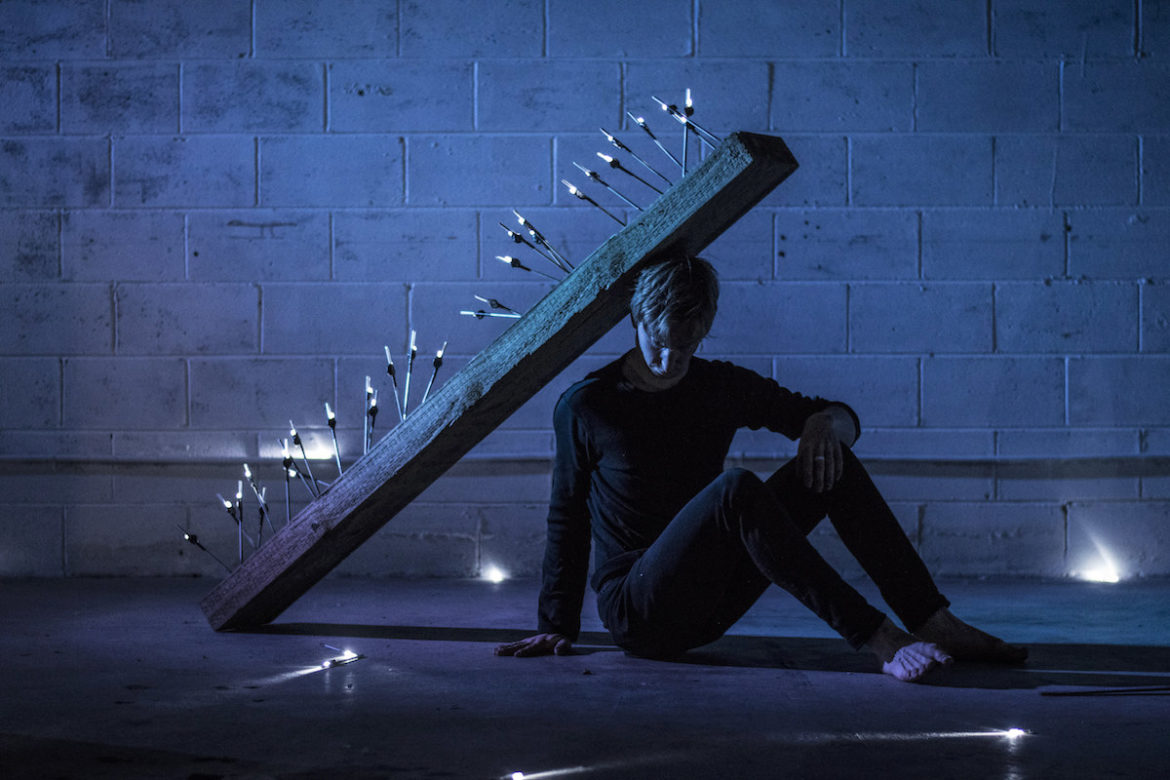Skye Gellman’s solo show End Grain feels a little lost, says First Nations Emerging Critic Carissa Lee
Note: in the original version of this review, the artist was misgendered
Skye Gellman is a genderqueer performance artist who is renowned for radical works that give narrative to human relationships to the world around us. They made their reputation with performances such as Snow, which invited audiences to interact in play, or ensemble pieces such as Scattered Tacks, which shows the darker side of circus-driven narratives. End Grain, a show at the Emerald City venue set up at the Arts House Meat Market for the Melbourne Fringe, is a solo work that made me wonder if they are a little lost without collaborators.
When we enter, the stage is empty except for a plank of wood suspended on an angle above the stage. The lighting is simple, growing to a warm pink over the duration of the show. There is no sound. We hear people outside the space, which is slightly distracting. It normally wouldn’t be a problem, but when Gellman appears and begins their introduction, their voice isn’t strong enough to compete with the outside noise.
They begin the show with an acknowledgment of country, taking the time to read it out, which is thoughtful. However, during the early part of the performance, Gellman hit their head on the suspended plank of wood behind them (and it sounded like it bloody hurt).
The show begins strongly. They precariously stack planks of wood, moving around them and balancing on them in postures such as handstands, using these balanced sculptures to move across the space. It feels as if Gellman is adding their body as a human element to the live production of sculptures. It’s intriguing to see the muscles in their shoulders engage when they move the planks of wood. The wobbles in these balancings keep me on edge, and I find myself consistently worried that they will fall off. This anxiety could be intentional on their part.
They occasionally address the audience, as if we just happen to be in their work space while they experiment with items, with the space, with their body. They begin to add random items to the stage: a stage light, a sheet. After the opening sequence, the blocks of wood sometimes fall over, the loud noise snapping us out of the space. With no carefully constructed silences within the show, these disruptions contribute to the feeling that we’re in this performer’s work space, rather than their space of performance.
There are times when they struggle to balance, and they fall off over and over again, but they let these attempts be what they are. I’m left wondering what exactly this show is. After a while, it starts to remind me of one of the guys I went to school with, who would climb on things, jump off things, just to see what would happen. The uncertainty of Gellman’s body in the space seems adolescent. There’s no Jackass crowing, no exclamation of intent or cheering, just a nonchalance bordering on apathy, masking the hope they won’t fall and make a dick of themselves.
Soon it begins to feel like Gellman is stalling the performance, as if they can’t bear to part with their audience. They start talking about their trip to Japan and their many followers there, show us objects that were cut out during rehearsals, and tell us about their knife collection. They then pick up a phone that has been on stage the whole time and play us sounds on their Spotify playlist.
They tell us that a lot of the spoken parts of their show were cut because “conversations ruin everything”. Yeah, no shit.
They then put on a balaclava, grab a dagger (items allegedly cut from the show), and tell us they’re heading out into the street, and could we please wait three minutes until they get back. They return with a hatchet and earmuffs, maybe taken from the boot of their car, and proceed to hack up one of the planks of wood they was using to balance on earlier. Splinters fly everywhere. The lights come down, but in spite of this they keep on performing.
If this were a show commenting on the neediness of millennial white males who play with knives, show us stuff on their phones rather than endure conversation and love a captive audience, because those audiences are often polite women, I would applaud. It certainly reminded me of many guys whom I no longer speak to for these reasons. Maybe if Gellman had pointed out that they are able to run through a dark street in a balaclava holding two weapons because they’re white, then I could get on board.
But I didn’t think they were doing either of those things. They looked like a performer who ran out of shit to do on stage and was grasping at straws to keep us there. In their desperate endeavour to entertain, they ran out to their car to get some more items, using the theatrics of a balaclava and dagger (possibly an illegal weapon), safe in the knowledge that if they were accosted by police, they’d be fine.
They held a polite audience captive for an extra 25 minutes past the scheduled finish, until the woman keeping the venue open came in and asked they could please wrap it up, because it was getting late. I hope I have other opportunities to see Gellman’s work, because it would be a shame if this confused performance was the only impression I have of them.
End Grain, written and directed by Skye Gellman. Performed by Skye Gellman, at Emerald City, Meat Market, Melbourne Fringe. Until September 29. Bookings
Access
All of Meat Market’s venue spaces are wheelchair accessible, although areas with cobblestone floors can be slightly bumpy due to their uneven surface.

